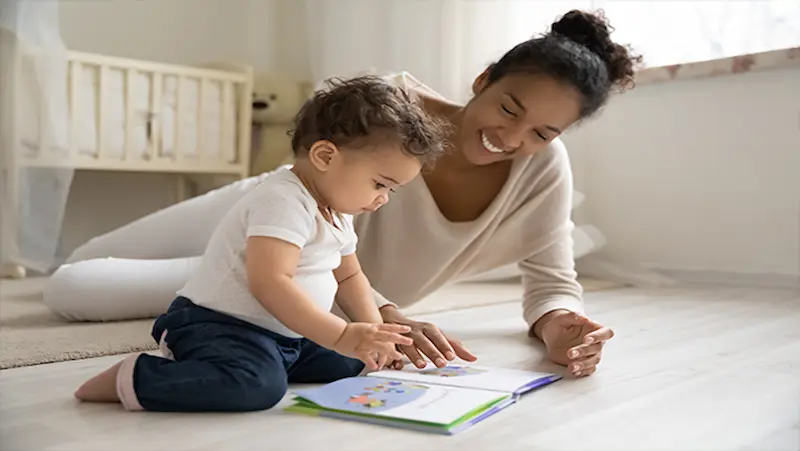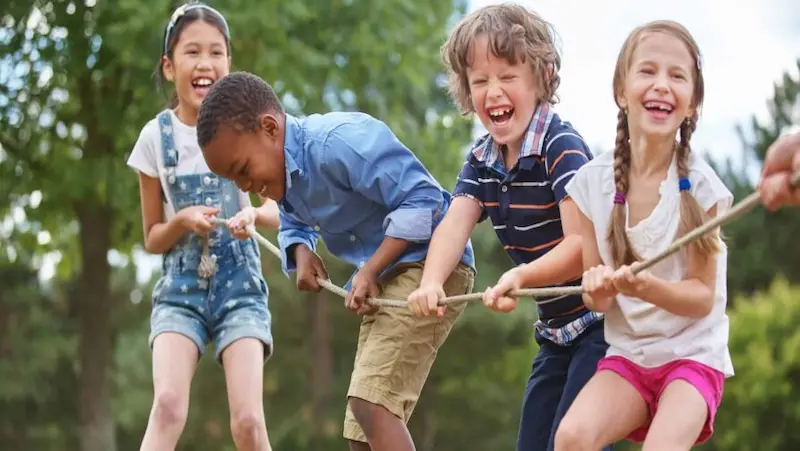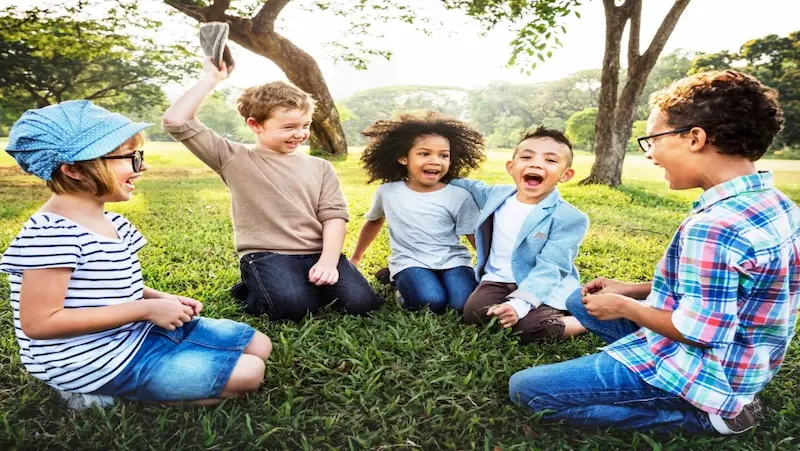In the vibrant world of preschoolers, where curiosity knows no bounds and friendships bloom like wildflowers, social skills play a pivotal role. These early years are not just about crayons and building blocks; they’re a critical foundation for a lifetime of social interactions.
Teaching our little ones the art of sharing, empathy, and effective communication isn’t just a choice; it’s an investment in their future. So, let’s explore the importance of nurturing these essential skills that will shape their journey through life.
Table of contents
The Importance of Social Skills in Preschoolers
Social skills in preschoolers are like the building blocks for future relationships, effective communication, and emotional intelligence. They might not be as easily quantifiable as counting to ten or reciting the alphabet, but their impact is profound and far-reaching.

Building Relationships
Social skills are the glue that binds friendships and lays the foundation for healthy relationships. Preschoolers who learn to share, take turns, and cooperate with their peers are more likely to form lasting bonds. These early connections foster a sense of belonging and help children feel secure in the world around them.
Communication
Effective communication isn’t just about using words correctly; it’s about understanding non-verbal cues, active listening, and expressing oneself. Preschoolers who develop strong social skills are better equipped to convey their thoughts and feelings, reducing frustration and tantrums.
Emotional Development
Understanding and managing emotions can be challenging for little ones. Social skills enable them to recognize their own feelings and those of others. This self-awareness is a vital step toward empathy and emotional intelligence. Children who can empathize are more likely to be compassionate and considerate individuals.
Understanding Preschooler Developmental Milestones

Understanding Preschooler Social Milestones
1. Making Friends: Preschool is often a child first foray into the social world beyond family. Kids begin to form friendships, although these relationships might be fleeting and based on simple interests or proximity. They learn to share toys, take turns, and interact with peers, albeit with some guidance from adults.
2. Expressing Emotions: Emotional regulation for kids expression becomes more nuanced during this time. You might notice your child development talking about their feelings, such as happiness, frustration, or sadness. They are also learning to identify these emotions in others and empathize, even if their understanding is still quite basic.
3. Conflict Resolution: Preschoolers are notorious for getting into disagreements over toys or territory, but it’s also when they start learning how to resolve these conflicts independently or with gentle guidance from adults. Teaching kids patience to use words instead of physical actions is a crucial lesson.
Understanding Preschooler Emotional Milestones
1. Building Self-Esteem: Preschoolers are gaining a sense of self and their place in the world. Encouragement and praise for their achievements, no matter how small, are vital for building their self-esteem. Positive reinforcement fosters confidence.
2. Developing Independence: This age group loves asserting their independence. They may insist on dressing themselves or making simple choices like what they want for breakfast. While it might slow you down, allowing them these opportunities to make decisions helps nurture their autonomy.
3. Handling Separation Anxiety: Some preschoolers may still experience separation anxiety when saying goodbye to their parents. It’s a sign of a strong attachment, which is entirely normal. As they become more confident in their surroundings and trust that you’ll return, this anxiety typically lessens.
Nurturing Positive Parent-Child Relationships

1. Lead by Example: Children are like sponges, soaking up everything they see and hear around them. Parents, you’re their first and most influential role models. So, if you want your child to develop strong social skills, show them what it means to be empathetic, patient, and respectful through your own actions.
2. Communication is Key: Engage your child in conversation from an early age. Ask about their day, listen actively, and encourage them to express their thoughts and feelings. By doing so, you’re teaching kids compassion them the value of communication, which is essential for building relationships.
3. Empathy Matters: Teach your child the importance of understanding and empathizing with others. Help them recognize emotions, both in themselves and in others. When they see you demonstrating empathy, they’ll learn to do the same.
4. Problem-Solving Skills: Life is full of challenges, big and small. Teach your child problem-solving skills by involving them in decision-making processes appropriate for their age. This not only boosts their confidence but also helps them develop the ability to resolve conflicts peacefully.
5. Play Together: Play is more than just fun; it’s a powerful tool for social development. Engage in imaginative play with your child. Through play, they learn to cooperate, negotiate, and take turns – skills that are vital for building relationships.
Creating Social Opportunities

Why Socialize?
Human beings are inherently social creatures. Our need for social interaction goes beyond mere pleasure; it’s hardwired into our DNA. Socializing offers a myriad of benefits, from reducing stress and boosting our mood to improving our communication skills, leadership skills for kids and expanding our horizons.
When we connect with others, we learn about different perspectives, cultures, and experiences. These encounters can lead to personal growth and help us become more empathetic and understanding individuals.
The Role of Opportunities
Creating opportunities for social interaction is essential because it doesn’t always happen spontaneously. In our fast-paced lives, we often need a nudge to step out of our comfort zones and meet new people. Here are a few ways to do just that:
1. Join Clubs or Groups: Whether it’s a book club, a sports team, or a hobbyist group, these gatherings offer a structured way to meet like-minded individuals.
2. Attend Workshops and Seminars: Professional events and workshops are fantastic places to network and learn from others in your field.
3. Volunteer: Giving your time to a cause you care about not only makes a positive thinking for kids impact but also introduces you to people who share your passions.
4. Online to Offline: If you’ve made connections online, take the step to meet in person. It can deepen your relationships and open up new opportunities.
5. Host Gatherings: Don’t wait for someone else to organize social events. Host a potluck dinner, game night, or outdoor picnic yourself.
Teaching Empathy and Emotional Intelligence

Empathy
It’s the art of stepping into someone else’s shoes. It’s about feeling what they feel, understanding their joys and sorrows, and showing genuine concern. Empathy lets us connect on a profound level, bridging the gaps between us.
Emotional Intelligence (EI)
Often called EQ, it’s all about recognizing, understanding, and managing emotions—both our own and those of others. It involves being aware of how emotions drive our actions and decisions and using that awareness to navigate social situations effectively.
Now, why are these concepts so vital to teaching, especially to the younger generation?
1. Improved Relationships: Empathy and EI lay the foundation for healthy, thriving relationships. By understanding emotions, we can communicate more effectively, resolve conflicts, and forge deeper connections.
2. Conflict Resolution: These skills are a life preserver in stormy seas of disagreement. They help us de-escalate conflicts by acknowledging and validating feelings, finding common ground, and seeking compromise.
3. Self-awareness: EI starts with knowing ourselves. When we understand our own emotions, we’re better equipped to manage stress, make informed decisions, and set goals that align with our values.
4. Empathy as a Force for Good: Teaching empathy instills kindness and compassion in our youth. It nurtures a sense of responsibility for the well-being of others and fosters a desire to make the world a better place.
Conclusion:
In conclusion, mastering social skills in preschool and beyond is like planting seeds that grow into a lifetime of meaningful connections, empathy, and success. These skills are not just lessons for the classroom; they’re tools for life. So, let’s nurture them early, and watch our children’s book flourish as they navigate the world with confidence and kindness.
Also, BrightChamps provides a comprehensive platform for learning about money for kids, offering interactive and engaging resources that teach financial literacy, budgeting, saving, and other essential money management skills.
Frequently Asked Questions
A1. Social skills are how we interact with others. For preschoolers, they’re crucial because they help kids make friends, solve problems, and express feelings, setting the stage for healthy relationships in life.
A2. Encourage playdates, teach sharing, and be a role model. Practice listening and empathy, and praise good behavior to boost their confidence.
A3. Preschoolers often struggle with sharing, taking turns, and handling conflicts. They’re learning to navigate a social world, so patience is key.
A4. Use simple language, practice sharing toys, and set timers for turns. Reward their efforts with praise to reinforce the behavior.
A5. Encourage talking about feelings, use open-ended questions, and actively listen. This helps them express themselves better.
A6. Arrange playdates, promote cooperation, and teach them to resolve conflicts peacefully. Model friendly behavior too.
A7. Games like “Simon Says” and “Duck, Duck, Goose” boost social skills. Cooperative board games also teach teamwork.
A8. Stay calm, show them how to express feelings, and brainstorm solutions together. It’s a valuable life skill.


 We are an army of educators and passionate learners from BrightChamps family, committed to providing free learning resources to kids, parents & students.
We are an army of educators and passionate learners from BrightChamps family, committed to providing free learning resources to kids, parents & students.







